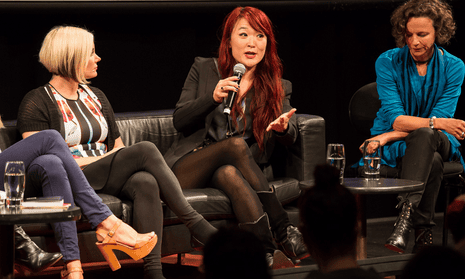Three Sydney sex workers have staged a protest at the Festival of Dangerous Ideas over the representation of their profession in a panel discussion on the global sex industry called Women For Sale.
During a session that also discussed pornography, IVF and surrogacy, they handed out pamphlets to festival goers and posed with an A3 sign that read: “I am a sex worker. I am not for sale”.
This year’s festival has been beset with controversy, including the cancellation of a talk on “honour” killings and calls for a boycott over links to the government’s asylum seeker policy.
“This is a festival of dangerous ideology,” one of the workers, Jules Kim, told Guardian Australia. “Sex workers are not ‘women for sale’. The panel discusses sex workers, but the festival did not invite sex workers to be on the panel even though they are the experts in this field.”
Kim, who is the acting chief executive of the Australian sex workers’ organisation Scarlet Alliance, applied to festival organisers St James Ethics Centre to be included on the panel which featured four writers and journalists, but had her request denied.
However, at the beginning of the discussion journalist Elizabeth Pisani invited Kim to replace her on stage and she was allowed to take part.
Kim said of the festival organisers: “You would think they’d want an actual sex worker [on the panel], but somehow that’s not important because we’re seen as victims; voiceless and having no agency.”
The co-founder and co-curator of the festival, Simon Longstaff of the St James Ethics Centre, said the intention of the sex workers to contribute to the discussion was “entirely appropriate”.
“However, I think that their cause could have been advanced in a stronger direction if they had used slightly different means. For example, taking the opportunity to express their opinion and then withdrawing back into the audience would have made a clear statement without seeking to dominate an agenda which was always intended to cover a broader range of issues.
“That said, a festival of dangerous ideas is always going to have interesting an exciting moments for which no one could have possibly planned.
“In my opinion what needed to be represented was a broad spectrum of opinion, which included the opinions of sex workers in Elizabeth Pisani, who was able to articulate the opinions that sex workers hold.
“One of the conscious designs of the festival is that ... there is opportunity for people to contribute in the Q&A and in that senses there was always an opportunity for sex workers or parents of sex workers or any part of the community to contribute to this discussion.”
The two other protesters, Zahra Stardust and Cameron Cox, said they were allowed to enter the panel only as audience members on condition they leave a bag carrying their sign and pamphlets at the entrance. Stardust said the festival was part of a “historical, structural, systemic problem”.
The advocate said lack of representation inevitably meant myths and misinformation harmful to the lives of sex workers would be reproduced. Those ideas would be used to justify the criminalisation of their work, and increase stigma and institutional discrimination.
She said among such myths were that all sex work is exploitation, all sex work is a result of human trafficking, sex work is an inherent form of violence against women, all sex workers are young, female and coerced, all clients are male, and that the criminalisation of sex work would end the sex industry.
The protesters said the panel – which overall was highly critical of sex work, emphasising its links to sexual slavery and human trafficking, and calling for criminalisation of receiving sexual services – failed to acknowledge the legitimacy of sex work.

Comments (…)
Sign in or create your Guardian account to join the discussion